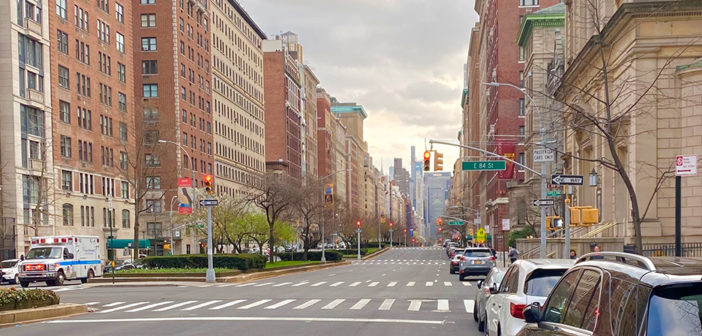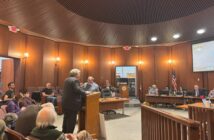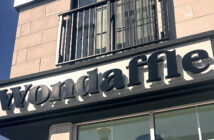The Brown and White spoke with students across the U.S. to hear about daily life in areas especially affected by COVID-19.
Emma Linde, ‘22, of Los Angeles; Jacob Kassis, ‘22, of New York City, and Sydney Webber, ’22, of Scarsdale, New York, address how the pandemic has changed their hometowns and reflect on the effect on their communities.
Note: This Q&A has been edited for length and clarity.
Q: Where are you from, and what has it been like growing up there?
Emma Linde: I am from Altadena, California. It’s a smaller city just north of Pasadena that sits right under the Los Angeles National Forest, specifically, Echo Mountain. From my house, it is about a 35-minute drive to the heart of Los Angeles, depending on traffic. I have lived here my whole life, until attending Lehigh, and absolutely love it. I went to a little elementary school less than 5 minutes away, and then went to private middle and high schools in Pasadena. Going farther away for college helped remind me of how special Altadena is, and its sunny weather.
Jake Kassis: Back then (In New York City), when everything was normal, you never thought about if it was safe to take the subway. You never thought about going to restaurants with friends or going to Central Park. Now, they have a built-up hospital with tents there. Life back then was a lot different than it is now — a lot more freedom.
Sydney Weber: I am from Scarsdale, New York, a suburb of Manhattan, and I have lived here since I was 4 years old. Living in the suburbs, we can go to the city a lot, if you have a fun event that you want to celebrate. It’s kind of a town where everybody knows each other, and we all look out for each other, and we’ve just been used to that lifestyle for our whole lives.
Q: How has life changed for you and your community since the outbreak of COVID-19?
EL: The outbreak forced me, like most other college students, to move back home. That reality in itself has drastically changed my life. Having to finish the rest of my sophomore spring semester online — from the desk I used in high school — is quite the adjustment. I am beyond happy to be with my family again, but the rest of the situation is off-putting. I basically only leave the house now to go run, walk my dog or get groceries/food. Even comparing my first couple days of being home with right now, a lot has changed or gotten more severe. I was initially looking forward to the perk of at least seeing my home friends again.
JK: When spring break started, I knew of the virus, and I heard it was pretty bad in Seattle. At that point, New York wasn’t really badly hit yet. When I first got back here, I was going out and living somewhat normally, and then a week later, it was completely different. I was inside, not going anywhere, and it was all over the news. A few days after that is when it all hit — the city shut down restaurants, bars and non-essential businesses. It is just a culture shock. I don’t think any of us have gone through life and not had access to these places we are used to.
SW: I’ve been quarantined for about three weeks now and, at first, I was in denial, and I stayed home, but it was shocking for me because I had been so used to going to Scarsdale Village in the center of town. It’s just part of people’s daily routines to go into town a lot. A lot of the stores started to close down one by one, and a lot of the restaurants started to close down. Sometimes, if I am bored, I go driving around, and I see these places completely shut down. It’s very quiet, so it’s extremely shocking to see that because it’s something we never expected to see. A lot of people in my community have now been walking outside, so it has brought the community closer in a way as well, although definitely been keeping our distance and following the 6 feet social distancing protocol.
But when you do walk outside, you tend to see similar faces, and it’s just brought the community much closer. Westchester as a whole has turned into a ghost area. Just a place where we never expected to see Westchester come to. It’s crazy, the local pizza places are closed, even places that stayed open in snow storms, and rainstorms and nor’easters have shut down. To see this transformation is something we have never seen before.
Q: What is daily life like right now?
EL: It’s nice that so many more people and families are going outside, but now, even the majority of trails and parks have been closed, and everything is a lot quieter. Most people I see out wear masks, and only a certain number of people are allowed in a grocery store at a time. I try not to think too much about how long this is going to last or about all the people who are suffering, and focus instead on the little pleasures I get with each day. I do hope that it won’t be terribly long until things start to get better, rather than worse. Until then, I am just trying my best to stay connected to all the people that I miss and be thankful for this extra time with my mom and brother.
JK: I haven’t left the house in 10 days. Before I started quarantining, I went on a bike ride with a friend in the downtown SoHo area, and it was amazing to see how empty it was. This is probably the only time in my life I will ever see New York so desolate. It’s a literal ghost town — no cars, no people. We haven’t been leaving the house much at all.
SW: I have been trying to get outside as much as I can, because staying indoors is extremely constant and, now, doing this routine religiously has been a little overwhelming because I have been doing the same thing every day, so it’s important for me to go outside and get some fresh air and see my neighbors faces and say hi to people around me, and also to know that everyone is feeling the same way is very comforting. To see people smile and just say hi in the afternoon brightens my day. It’s always nice to see the community as a whole and to know that we are all here for eachother as well.






Comment policy
Comments posted to The Brown and White website are reviewed by a moderator before being approved. Incendiary speech or harassing language, including comments targeted at individuals, may be deemed unacceptable and not published. Spam and other soliciting will also be declined.
The Brown and White also reserves the right to not publish entirely anonymous comments.